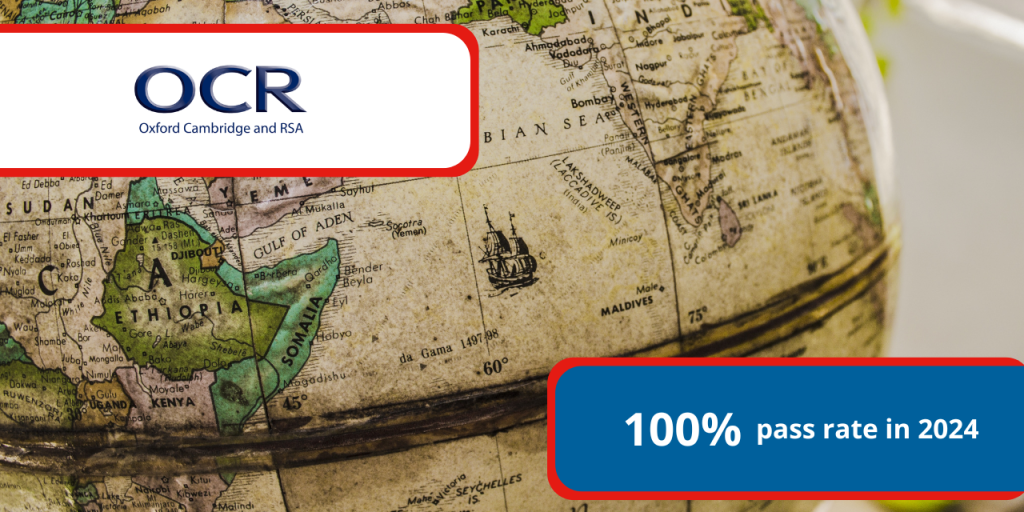Call free on: 0800 389 2839
Call free on: 0800 389 2839
Explore Our courses
Geography A Level
OCR

From coastal landscapes to human rights, A level Geography will provide you with observational and analytical skills to take into a wide range of higher education or career opportunities.
Interested in a career in the rapidly growing green industry? With the green sector projected to create millions of jobs in the next decade, our A level Geography course covers crucial topics like climate change, coastal systems, and environmental management. Dive deep into these issues to understand the factors driving global climate patterns and their effects on our world. Equip yourself with the knowledge and skills needed for careers in environmental science, urban planning, and conservation. Start your journey today and contribute to solving key climate challenges!
Pursuing A level Geography through the National Extension College (NEC) offers an extensive exploration of both physical and human geography, making it suitable for those with a keen interest in understanding the world around them. This online A level Geography course covers diverse topics such as coastal landscapes, Earth’s life support systems, global migration, human rights, and climate change.
Designed to inspire curiosity and enhance comprehension, the distance learning A level Geography curriculum includes fieldwork assignments and tutor-marked tasks. It provides a solid foundation for further studies in geography, environmental science, or urban planning and opens up career opportunities in teaching, law, human rights advocacy, and environmentalism. Enrol in our online A level Geography course today and start your journey to a deeper understanding of geographical principles, guided by expert tutors and enriched by interactive, high-quality learning materials.
Multi-buy A levels:
Purchasing more than one A level? Use voucher code ALMB10 to receive 10% off at checkout.
Why study A level Geography?
From Arctic tundra and volcanoes to urban landscapes and human habitats, this course has been designed by subject experts to introduce you natural wonders both far-flung and in your local area, and how we as humans interact with the world. This A level course has been designed to give you context around sociological inequality, climate change and human rights through a geographical lens.
As a subject, geography opens up and informs a wide range of career fields and jobs including:
- Teaching
- Law
- Sociology
- Human rights advocacy
- Climate change and environmentalism
- Oceanography
- Travel and tourism
- Photography
- Wildlife conservation
- Urban development
- Politics
Course content
Section 1 Coastal landscapes
- Topic 1 The coastal landscape as a physical system
- Topic 2 Processes in coastal landform development
- Topic 3 Coastal landforms
- Topic 4 Coastal case studies
- Topic 5 Coastal landforms and climate change
- Topic 6 Managing coastal landscape systems
- Topic 7 Effect of economic development on coastal landscape systems
- Section 1 Fieldwork
- Assignment 1
Section 2 Earth’s life support systems
- Topic 1 The water cycle
- Topic 2 The carbon cycle
- Topic 3 Water and carbon cycles in the tropical rainforest
- Topic 4 Water and carbon cycles in the Arctic tundra
- Topic 5 Changes in the water and carbon cycles over time
- Topic 6 Managing the global water and carbon cycles
- Section 2 Fieldwork
- Assignment 2
Section 3 Changing spaces; making places
- Topic 1 What is a place?
- Topic 2 Perceptions of place
- Topic 3 Social inequality
- Topic 4 Social inequality: two case studies
- Topic 5 Who influences economic change?
- Topic 6 Making a place
- Section 3 Fieldwork
- Assignment 3
Fieldwork assignment
- Fieldwork assignment
Investigative geography: NEA
- Topic 1 Planning, purpose and introduction
- NEA Proposal submission
- Topic 2 Data collection and sampling
- Topic 3 Data presentation techniques
- Topic 4 Data analysis and explanation
- Topic 5 Conclusions and investigation evaluation
- Topic 6 Overall quality and communication
- NEA submission
Section 4 Global migration
- Topic 1 Global migration patterns
- Topic 2 Factors influencing global migration
- Topic 3 Migrant flow corridors and interdependence
- Topic 4 Unequal migration flows
- Assignment 4
Section 5 Human rights
- Topic 1 What are human rights?
- Topic 2 Women’s rights
- Topic 3 Global governance of human rights
- Topic 4 Human rights and development
- Assignment 5
Section 6 Climate change 1
- Topic 1 Earth’s dynamic climate
- Topic 2 Industrialisation and the global climate
- Topic 3 The climate change debate
- Assignment 6
Section 7 Climate change 2
- Topic 1 Climate modelling
- Topic 2 Implications of climate change
- Topic 3 Mitigation and adaptation strategies
- Topic 4 The geopolitics of tackling climate change
- Assignment 7
Section 8 Hazardous earth 1
- Topic 1 Theories of continental drift and plate tectonics
- Topic 2 Features and processes at plate boundaries
- Topic 3 Variety of volcanic activity
- Topic 4 Hazards from volcanic eruptions
- Topic 5 Variety of earthquake activity
- Topic 6 Hazards from earthquakes
- Assignment 8
Section 9 Hazardous earth 2
- Topic 1 Human impact of volcanic eruptions
- Topic 2 Human impact of earthquake activity
- Topic 3 Strategies to manage hazards from volcanic activity
- Topic 4 Strategies to manage hazards from earthquakes
- Topic 5 Hazardous earth: change over time
- Assignment 9
What you need to know
Exam board
- OCR A level Geography H481
Format
- Online learning with tutor-marked assignments
Hours
- Complete at your own pace
- Approx. 250-300* hours plus time for completing assignments
*The specification suggests that 300 hours is needed. You’ll also need time to complete assignments and prepare yourself for exams and some courses like English literature involve a lot of reading. Everyone is different so it’s impossible to say with certainty how long a course will take you, but you should expect to spend longer than 300 hours. Taken across the length of time we recommend, this equates to approximately 5 hours per week. This will increase if you choose to take it over a shorter time frame or may be less if you are retaking a subject and have covered a lot of of the course content.
Assignments
- 11 assignments (one introductory) – these do not contribute towards your final grade
Resources
Barker, D et al (2021) OCR A level Geography (3rd edition), London: Hodder Education ISBN: 978-1-3983-1257-9
An e-book version is provided as part of the course, but you may want to buy your own hard copy if you would find that easier to work with.
Requirements
- Internet access
- Computer operating system and browser to support learn@nec
What's included?
Our course fees are clear and transparent to help you plan for any additional costs.
Your course fee includes:
- 24/7 access to learn@nec platform and resources
- Expertly designed online course materials (including ebook versions of textbooks where specified) that you need to complete the course
- Support from our Student Services team
- Structured assignments carefully designed to prepare you for exams
- Guidance from your tutor for up to 24 months from your date of enrolment
- Extensive feedback to all assignments that will support your learning
- NEA (coursework) marking and authentication
- Marking for one examination paper (from a previous year)
- Guaranteed exam place
- NEC’s guide to study skills: How to Succeed as an Independent Learner
- Spelling, punctuation and grammar guide
- Time planner template to help you plan your study timetable
- Information on how to apply for exams
Your course fee does not cover:
- Any fees in relation to exam entries or assessments
- Centre Assessment Grades (CAG) in the event of exam cancellation
- Recommended textbooks for additional reading or set texts
If you need more support, you can purchase:
- Online tutorials – if you need help with a specific topic you can arrange a 30 minute or 1 hour tutorial
- Additional past paper marking – to help with your exam preparation
- Revision tutorial – to plan your revision and explore revision techniques
- Help with your UCAS application service
For further information on additional/optional support you can purchase, please visit our additional services page.
Exams and assessment
Assessment is by examination (80%) and non-examination assessment (NEA, 20%).
- Paper 1: Physical systems (1 hour 30 minutes)
- Paper 2: Human interactions (1 hour 30 minutes)
- Paper 3: Geographical debates (2 hour 30 minutes)
Non-exam assessment
Unlike other NEC assignments, your NEA will count towards your final grade. Your tutor will mark your final submission, and then your work is internally moderated (double checked by another assessor), before finally being submitted to the awarding body for external moderation. This ensures that the marking is thorough and fair. You can find more information here.
Additional support if you are under 18
We know that our younger students often need an extra helping hand with their studies. In our experience learning online works best when either a parent or guardian are involved. This is why NEC has developed our unique Progress Tracker to help you to support your child.
NEC’s Progress Tracker will allow you to easily track your child’s progress across their subjects and gain insight to how well they are doing through access to their assignment grades and tutor feedback.
Read more about how we work with young students who are studying at home or through a school.
Arrange a call back with a member of our Course Advice Team.
Would you like to talk to our Course Advice Team about the best route for you? Visit our Contact Us page, fill in the form and a member of the team will get back to you!
Key facts
Course Fees £740
It’s your choice: you can pay in full at the point of enrolment, or you can spread the cost over monthly instalments with our finance offer. We offer a choice of six or 12 month repayment plans, with 0% APR as standard.
To pay in instalments you will need to enrol by telephone.
Representative example:
Course fee: £740
Deposit: £74.00
Amount of credit: £666.00
Monthly payment: £55.50
Duration of agreement: 12 months
Total repayable: £740
Rate of interest: 0% (fixed)
0% APR representative.
The National Extension College (NEC) work with finance company OMNI. For more information on our relationship with OMNI and repayment plans see our Fee Information page.
learn@nec is our virtual learning environment, the gateway to your course and the NEC community. All the resources you need to study are here and you have the flexibility to access them wherever you want, whenever you want
Study at your own pace.
There are no academic requirements for this course.
Course materials are written in English so a good level of written English is required.
As part of NEC’s mission to widen participation our team is happy to discuss payment options unavailable online. Please contact our team on 0800 389 2839 or email info@nec.ac.uk


